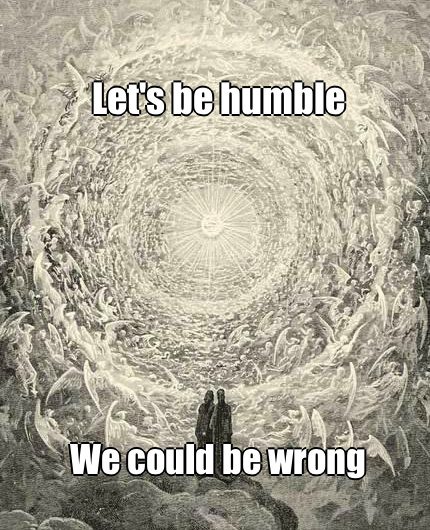Connor Wood
On this summer Saturday in Internetland, where everyone is an expert, here’s an image we could all benefit from:

Everybody, myself included, loves to feel right. This extends to religious people, atheists, scientists, and pundits (especially pundits). One thing that worsens this addiction to being right is becoming an “expert” – for example, earning a PhD or gaining public recognition in a field. I’ve noticed this tendency in myself over the years in my doctoral program.
As I’ve done more research, I’ve developed more ideas about what religion is and what role it plays in people’s lives, and my love of being right has only increased. In some ways, this is understandable and acceptable – after all, it’s pretty counterproductive when just anyone can stand up on a soapbox and act like an expert. This is why we have doctoral programs and rigorous exams – to make sure that the people who are experts are actually, well, experts.
And in my doctoral training, I’ve done enough hard work, research, and reading to have developed some strong opinions. For example, I think the evidence points clearly to an evolutionarily adaptive role for many religious practices. Synchronous activities – doing things in time with others, like singing together or even bowing at the same time toward Mecca – seem to bond people to one another, making them more generous more willing to make sacrifices for the group. Costly religious requirements, like circumcision and fasting, strengthen groups by serving as signals of people’s wholehearted investment in the collective. By binding people together into tight collectives, religion has probably helped many groups and individuals survive throughout history. A quote from Charles Darwin’s The Descent of Man sums up how this could work:
There can be no doubt that a tribe including many members who, from possessing in a high degree the spirit of patriotism, fidelity, obedience, courage, and sympathy, were always ready to aid one another, and to sacrifice themselves for the common good would be victorious over most other tribes; and this would be natural selection.
…But I could be wrong. My view of religion’s adaptive role depends on group selection: the idea that evolutionary pressures operate at the level of groups as well as genes. This is a controversial position, and in contrast to Darwin, many of today’s evolutionary biologists reject it. (Perhaps not coincidentally, Richard Dawkins is one of them, and we all know how he feels about religion.) Of course, some very prominent biologists, including E.O. Wilson, Martin Nowak, and David Sloan Wilson, are on my side. These scientists have made powerful arguments that groups as well as genes can undergo natural selection, which then affects the genetics of group members. But that doesn’t change the fact that the debate isn’t settled, and we could still be wrong.
I could be wrong about other things, too. Religion might turn out to actually be bad for people, as the Richard Dawkinses and Sam Harrises of the world like to claim. While religion certainly hurts some people sometimes, I don’t think this will turn out to be true. But it’s vital for me to keep my mind open to the possibility.
The thing is, people often talk about Science (with a capital “S”) as if it’s a clear and perfect window into Truth (with a capital “T”). I don’t think this is true. I think science gives us remarkable tools to reflect on the world and come up with ways to test our ideas about it. But our ideas are always just that – our ideas. The world is, by definition, always bigger, badder, wilder, and more complex than our ideas could ever be. Map, in other words, is not territory. You have to simplify the world to create models of it. This doesn’t mean our models or ideas aren’t accurate, or useful – not at all! We used Newtonian mechanics to send rocket ships to the moon, for Pete’s sake. Something about science sure works.
But, of course, Newtonian theory isn’t completely correct. 60 years before the Apollo program, the Newtonian worldview had already been superseded by Einsteinian relativity. The speeds and masses involved in sending the Apollo ships to the moon simply weren’t large enough for us to need relativity theory. So we actually sent men to the moon using an outdated, and incorrect (or at least incomplete), theory of physics. Wild, isn’t it? Just because science works doesn’t mean it necessarily tells us the 100% truth about the world. And its success doesn’t mean we shouldn’t be humble – even radically humble.
This goes for scientist and non-scientist, religious believer and skeptic. No matter how strong our convictions, we should always leave room for reexamining our beliefs, for being open to the unexpected. Otherwise our ideas about the world harden into stone – and stone is opaque. I’ll leave off here with a quote from the Jewish theologian Abraham Heschel, who would have wholeheartedly agreed:
Part company with preconceived notions, suppress your leaning to reiterate and to know in advance of your seeing, try to see the world for the first time with eyes not dimmed by memory or volition, and you will detect that you and the things that surround you – trees, birds, chairs – are like parallel lines that run close and never meet. Your pretense of being acquainted with the world is quickly abandoned.











